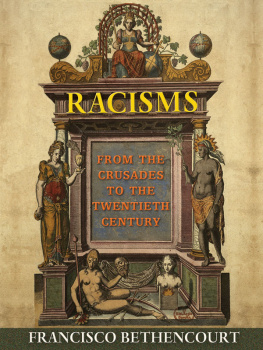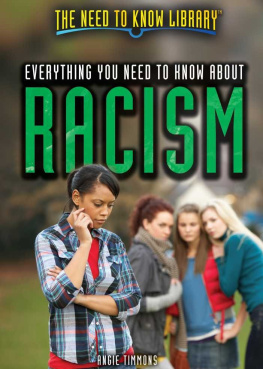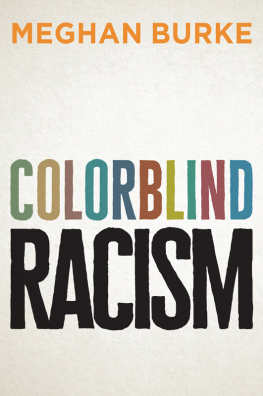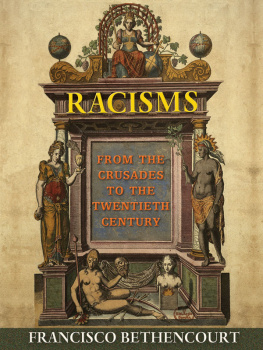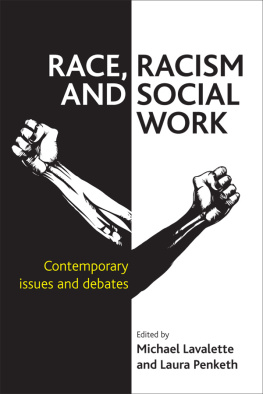
RACISMS
RACISMS

FROM THE CRUSADES TO THE TWENTIETH CENTURY

FRANCISCO BETHENCOURT
PRINCETON UNIVERSITY PRESS
PRINCETON AND OXFORD
Copyright 2013 by Princeton University Press
Published by Princeton University Press, 41 William Street, Princeton, New Jersey 08540
In the United Kingdom: Princeton University Press, 6 Oxford Street, Woodstock, Oxfordshire OX20 1TW
press.princeton.edu
Jacket illustration: Abraham Ortelius (Oertel) (15271598). Title page of the Theatrum Orbis Terrarum. Map from: Abraham Ortelius, Theatrum Orbis terrarum, Antwerp, 1570. Kartenabteilung. Courtesy of bpk, Berlin / Staatsbibliothek zu Berlin, Stiftung Preussischer Kulturbesitz, Berlin, Germany / Art Resource, NY
All Rights Reserved
Library of Congress Cataloging-in-Publication Data
Bethencourt, Francisco.
Racisms : from the Crusades to the Twentieth Century / Francisco Bethencourt.
pages cm
Includes bibliographical references and index.
ISBN 978-0-691-15526-5 (hardcover)
1. RacismHistory. 2. Race relationsHistory. 3. Race. I. Title.
HT1521.B474 2013
305.8009dc23
2013019883
British Library Cataloging-in-Publication Data is available
This book has been composed in Minion Pro and Dante
Printed on acid-free paper.
Printed in the United States of America
10 9 8 7 6 5 4 3 2 1
FOR ULINKA

CONTENTS
ILLUSTRATIONS
MAPS
ACKNOWLEDGMENTS
I began to seriously research this book during the 20045 academic year with a fellowship from the Calouste Gulbenkian Foundation. In 20089, sabbatical leave granted by Kings College London contributed to making this work possible: several chapters were written during that period. I am extremely grateful to both institutions.
I would like to thank colleagues and friends who agreed to read extensive parts of the book for their advice: Sir John Elliott, Ludmilla Jordanova, Miri Rubin, and Jonathan Steinberg. Anthony Molho and Elisabeth McGrath read first drafts of chapters or parts of chapters. The anonymous reviewers of the manuscript raised important questions and pointed out significant details. They are not responsible for any remaining errors, but they certainly helped me to avoid mistakes and contributed to clarify my reasoning. Al Bertrand, the publishing director for Europe at Princeton University Press, has been enthusiastic about the book from the moment he decided to contact me. His support and vision have played a crucial role in this project. I am grateful to Helen Hancock for providing a reliable, competent, and engaging revision of my manuscript, as I am not a native English speaker.
The final text benefited from the discussion of papers I presented to various universities, particularly the seminar on world history at Cambridge University, the seminar on empires at the Institute of Historical Research in London, the Beyond Slavery symposium at the University of Liverpool, the J. H. Parry Lecture at Harvard University, the seminar on early modern history at the University of Pennsylvania, the seminar on early modern history at the University of Oxford, the seminar on races in Latin America at the University of Warwick, the seminar on global history at the University of Notre Dames London Centre, the medieval and renaissance seminar at University College London, the humanities research seminar at Wolfson College Cambridge, and the seminar on history at the University of Manchester. The Racism and Ethnic Relations in the Portuguese-Speaking World symposium I organized with Adrian Pearce also provided a forum to debate the main theoretical issues. The students in my European Expansion: Civil Rights and Ethnic Prejudices as well as World History: Power and Inequality courses offered important feedback. I would like to further acknowledge conversations with Luiz Felipe de Alencastro, Sir Christopher Bayly, Harald Braun, Peter Burke, Michel Cahen, Diogo Ramada Curto, Richard Drayton, Rebecca Earle, Felipe Fernndez-Armesto, Antonio Feros, Serge Gruzinski, Antnio Srgio Guimares, Maria Concepcin Garca Siz, Herbert Klein, Jean-Michel Massing, Joe McDermott, Anthony McFarlane, Kenneth Maxwell, Andrea Nanetti, Linda Newson, Maria Lcia Pallares-Burke, Jos Pedro Paiva, Pedro Ramos Pinto, Lyndal Roper, Laura de Mello e Souza, Jorge Vala, and Peter Wadeall of which helped to refine my research.
The preparation of this book was a long journey, coinciding with the creation of my family. Ulinka has been an extraordinary companion, wife, and mother of our children, Joo and Sophie. They all made me discover the symbiosis of passion, love, and harmony. I can only say that the life of our family has been a blessing to me; it allowed me to develop this work within an entirely relaxed and loving atmosphere. As a historian, Ulinka asked me the most challenging questions, which contributed to developing my argument and theoretical framework. For all this I dedicate the book to her. My father passed away in the last stage of this books preparation. Throughout our lives, we were united by strong love and the kind of complicity that survives death. He exemplified sensibility, sharp observation, confidence, loyalty, perseverance, humor against adversity, and an enjoyment of life that I will always carry inside me.
RACISMS

Introduction
T his book represents a departure from the largely consensual view that the theory of races preceded racism. It also challenges recent revisionist scholarship, which traces the invention of racism back to classical antiquity. It rejects the idea of racism as innate phenomenon shared by all humankind. I argue that particular configurations of racism can only be explained by research into historical conjunctures, which need to be compared and studied in the long term. Racism is relational and changes over time; it cannot be fully understood through the segmented study of short periods of time, specific regions, or well-known victimsfor instance, black people or Jews.
The notion of racism I will use in this bookprejudice concerning ethnic descent coupled with discriminatory actionprovides the basis for this long-term approach, enabling us to chart its different forms, continuities, discontinuities, and transformations. I focus my research on the Western world, from the Crusades to the present. Internal ethnic prejudice and discrimination are visible in Europe from the Middle Ages to the twentieth century, while the European expansion created a coherent set of ideas and practices concerning hierarchies of peoples from different continents. I do not maintain that the reality of racism is exclusive to this part of the world; Europe simply provides a relatively consistent setting that will be compared to other parts of the world where similar phenomena have manifested themselves.
Next page
